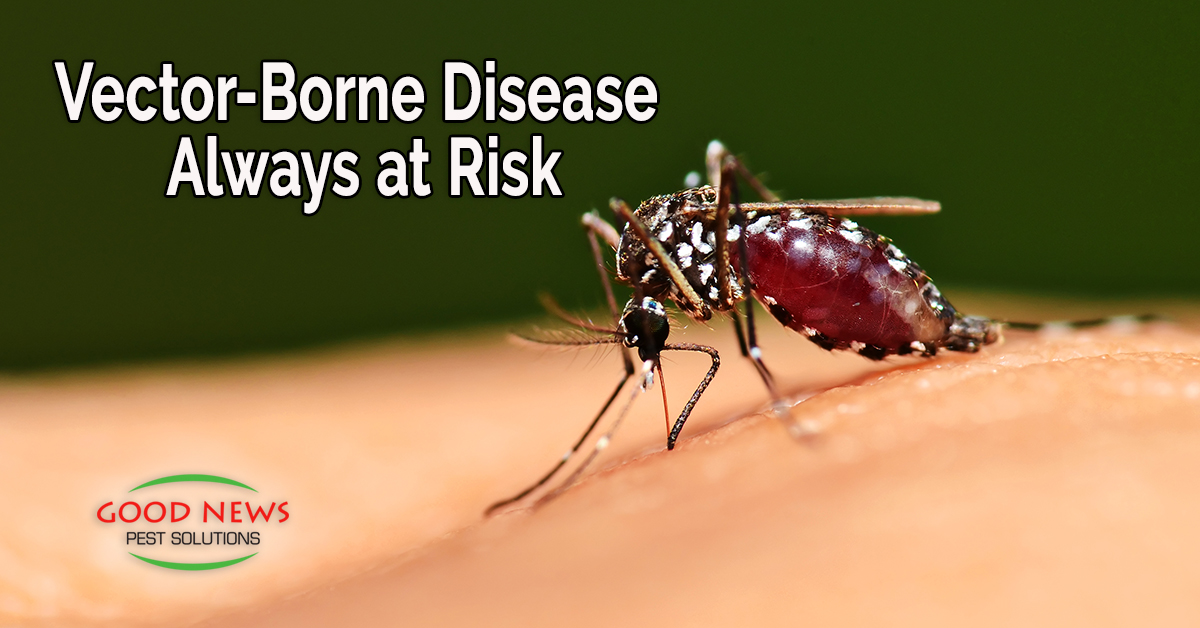
Vector-Borne Disease - Always at Risk
Looking back at the past 24 months, it should be no surprise to anyone that the United States government tends to be more reactive to problems and sometimes can’t quite stick the landing. That’s not always a bad thing – being flexible and reactive to an immediate threat has its benefits. But at the same time, it’s hard to plan ahead when you’re always moving from one crisis to the next.
It wasn’t that long ago that we were dealing with a major outbreak of the Zika virus. And before that, West Nile Virus was a significant threat. Those threats may feel like they’re in the distant past now – but the CDC and WHO say those pathogens are still very much a concern. It doesn’t help that the news media flits from ecological disaster to sporting event to crime wave. It’s just the nature of the human attention span.
That’s why we at Good News Pest Solutions wanted to take a moment to educate and inform you about the ongoing dangers of vector-borne diseases. Not to spread fear – but so that you can take the proper precautions to protect yourself and your family.
Rolling in the VBD
Scientists say that about 17% of all infectious diseases that attack humans are vector-borne diseases or VBDs. That includes Dengue fever, West Nile Virus, Lyme disease, and Malaria. While it may be easy to turn away and say those are third world diseases, from the year 2000 to 2014, some 22,000 people in the United States were hospitalized for Malaria and it still affects 1500 people a year here.
Not to mention the more diseases there are in any part of the world, we are all affected and outbreaks can spread more rapidly in this era of mass transit.
Of course, the real villain here – the big reason we’re talking about VBDs - is because their usual method of transmission is through bug bites. Mosquitoes, ticks, fleas, and lice are all vectors, not only spreading disease between humans but from animals to humans and sometimes vice versa.
We can often track the movement of these pathogens and parasites by seeing where the mosquitoes and ticks have been and where they’re going.
Just last month, The Journal of Medical Entomology published a new study that discovered another problem. Not maintaining efforts and new technologies to control insect populations has led to the insects building up a resistance to current treatments.
That means not only are there fewer efforts to reduce mosquitoes, ticks and the diseases they carry, the efforts we do make are less effective. That opens the door for another Zika or West Nile virus wave – or even another virus we haven’t yet seen.
Tick, Tick… Boom!
Summer vacation isn’t as far off as you may think. That means camping trips, wooded hikes and hunting for wildlife – with a camera or a rifle. What do these activities all have in common? They all take place where ticks, fleas and lice like to hang out – and they can latch onto us or ride our pets indoors.
Every time you bring your dogs inside you should at least do a cursory check to make sure they haven’t picked up hitchhikers unaware. You should probably check your campers too. If you find a tick or thirty, wipe rubbing alcohol over the skin and use a pair of fine tipped tweezers to grab the insect as close to the bite point as possible. Resist the urge to pinch, but slowly draw it straight up and out, then wipe down the bite with rubbing alcohol or soap and water. It is important to get the tick’s head out!
Mosquito Control
Our weather here on the Gulf Coast of Florida is about to get warmer and wetter, creating prime breeding ground for mosquitoes. We get new mosquitoes when the lady skeeters lay their eggs in standing water, the water dries, and the return of rain hatches the eggs.
You’ll want to keep an eye out for standing water and remove it so there’s no opportunity for those momma mosquitoes to lay their brood. You can also employ things like planting lemongrass – the natural source for citronella. Mosquitoes hate it but you might like the zesty lemony flavor that you can use for cooking.
Marigolds and sweet basil are also effective at driving away mosquitoes – although I wouldn’t try munching on a marigold flower. Wearing loose fitting clothing, especially in bright colors will confuse mosquitoes searching for a meal. Kick on a fan – and lose the beer. The moving breeze keeps mosquitoes away. The odor of alcohol attracts them.
If you’re planning any picnics or backyard BBQ’s, you can plan ahead and have your Good News Pest Solutions technician drop off our exclusive No Bite Zones Mosquito Protection MosquitoPaqs. This revolutionary, natural technology turns munching momma mosquitoes into vegans! So they’ll no longer seek out you or your animal friends for dinner – and neither will their kids! It’s safe for everyone and at an affordable price. Hey, Memorial Day will be here before you know it.
To learn more about how mosquitoes and ticks spread viruses and how you can do your part to spread understanding and health, just give us a call!
« Back to BlogProudly Serving
Sun City Center, Ruskin, Palmetto, Parrish, Ellenton, Bradenton, Anna Maria, Holmes Beach, Bradenton Beach, Longboat Key, Lakewood Ranch, University Park, Myakka City, Sarasota, Siesta Key, Osprey, Nokomis, Casey Key, Venice, Englewood, North Port, Port Charlotte, Punta Gorda, Arcadia
Things You Can Do
Pay Your Bill Online
Leave Us a Review
Request a Free* Termite Inspection
Stop Mosquito Bites
Get Rid of Rodents
Get a Termite Damage Warranty
Get Pest Control for Your Attic
Get Pest Control for Your Business Request Prayer
Corporate Address
1080 Enterprise Court, Ste A
North Venice, FL 34275
Call Now: (941) 412-9610
Text: (941) 412-9610
Fax: (941) 412-0080
